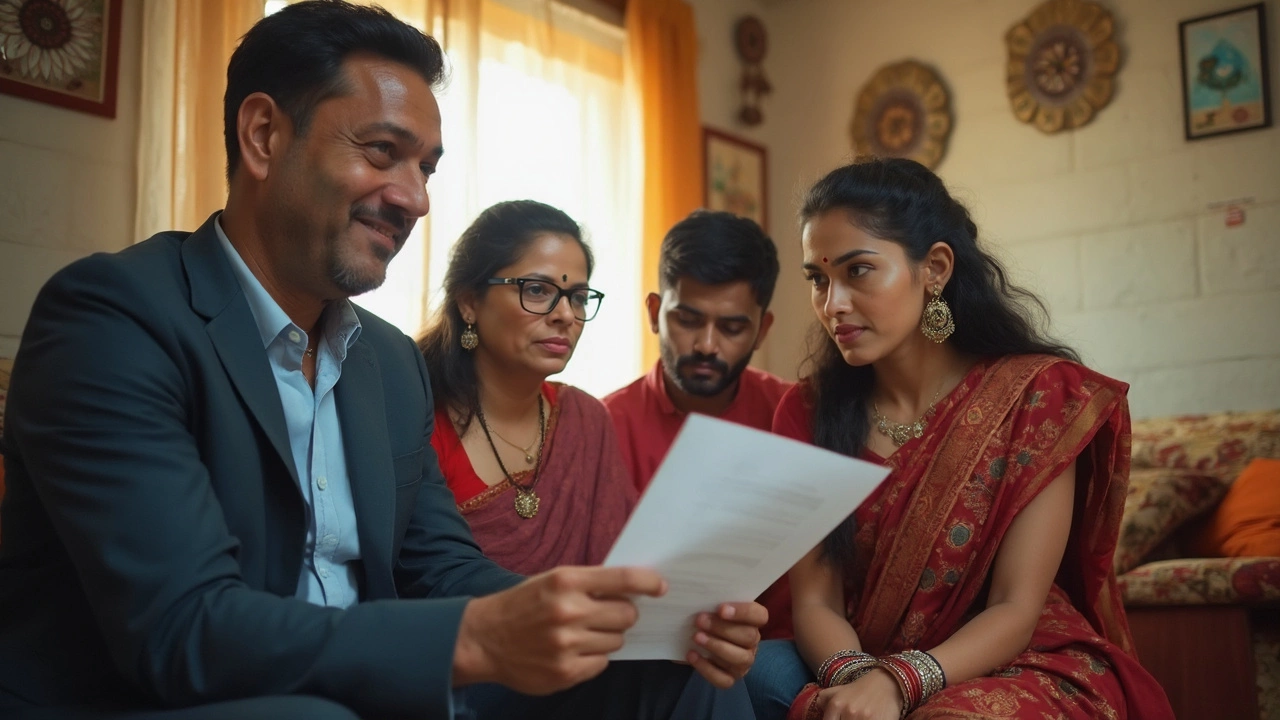The stakes are high when you’re dealing with divorce, custody, or support issues. That’s exactly why scams in family law hit so hard—they target folks who are stressed and desperate for help. So, how do you sniff out a scam before you get burned?
Watch out if the very first thing a lawyer does is ask for a giant upfront fee (think thousands of dollars) before even hearing your story. Real family law attorneys usually share their fee schedules up front, break down what you’re paying for, and offer options—like a free or low-cost first consultation. If someone demands cash right away, gives you a vague receipt (or none at all), or tells you not to worry about the details, hit pause fast.
- Shady Fee Structures and Upfront Demands
- Too-Good-to-Be-True Promises
- Communication Red Flags
- Smart Steps: Protecting Yourself
Shady Fee Structures and Upfront Demands
If you’re hiring a family law attorney, you want to know how much things will cost. But scammers love to bury you in confusing bills or demand big chunks of cash before doing any work. This is one of the top complaints people make to their state bar. The American Bar Association says every fee should be clear, written out for you, and explained in plain language. If a lawyer dodges questions about what the bill covers, or keeps sending surprise charges, that’s a flashing red light.
Some fake lawyers will push you to hand over all your money up front, calling it a “retainer”—but then go silent or do barely any work. Real attorneys usually ask for a deposit and then bill you in chunks as the case moves along. Be super wary if someone doubles or triples their fee halfway through, or keeps asking for more with nothing to show for it.
- Refuse pressure to pay cash, especially if the attorney won’t give a real receipt or only takes payments in weird ways like gift cards or Venmo.
- Avoid lawyers who want 100% of their fee before you’ve even seen a contract or met for a real consultation.
- Check for written fee agreements—this is standard and required in most states, especially if the bill is more than a few hundred bucks.
You’re allowed to ask for a detailed invoice breaking down hours, tasks, and costs. If a lawyer refuses or gets defensive, big red flag.
| Fee Type | Standard Practice | Scam Warning |
|---|---|---|
| Initial Consultation | Free or low cost ($100-$250) | No consultation, immediate high fee demand |
| Retainer | Partial up front, rest billed over time | Insists you pay full case cost up front |
| Payment Methods | Check, card, bank transfer | Cash only, gift cards, peer payments |
If you feel unsure or rushed, slow down. Check with your state bar—most have online attorney lookups and records of formal complaints. Protect your money before you hand it over. Even in an emergency, you deserve straight answers and paperwork you can actually read.
Too-Good-to-Be-True Promises
If a family law attorney guarantees you’ll win your case, run for the hills. Real lawyers know there are no sure things in court, especially in messy family law fights. Even the best can’t promise specific results. These scammers count on your stress—they know it’s tempting to grab onto any promise that’ll end your problems fast.
Here’s a tell: If someone says your divorce will be “done in a week” or “you’ll definitely get the house and full custody,” you’re hearing wishful thinking, not professional advice. Honest lawyers spell out your risks and don’t sugarcoat the process. They’ll explain what could go wrong, not just what feels good to hear.
“If your lawyer is promising guaranteed outcomes, find another lawyer. The only guarantee is that there are no guarantees in court.”
— American Bar Association
The truth is, courts look at tons of details: your past, your partner’s past, the kids, financial stuff—no one can control it all. A 2023 survey by the National Family Law Association found that 68% of people who hired high-pressure lawyers with big promises ended up disappointed with the results (and their bill).
| Promise Claimed | % of Cases Where Lawyers Could Deliver |
|---|---|
| Full Custody Guaranteed | 22% |
| Quick Divorce (under 1 month) | 17% |
| Guaranteed Asset Split | 19% |
So, what does this mean for you? Don’t let a slick “guarantee” cloud your judgment. Ask the lawyer what the risks are, and how they’ll handle surprises. If they dodge or get annoyed—huge red flag. Only a scammer will say they can guarantee everything in family law. The best attorneys build trust by being straight with you, even if the truth isn’t what you hoped for.

Communication Red Flags
The way your lawyer talks to you says a lot about whether you’ve hired a pro—or someone out to take advantage. Let’s be real: calling once, then disappearing for weeks, is a top sign you might be dealing with a scam. Legit family law attorneys keep you updated and answer your calls or emails in a reasonable time (usually within two business days).
If your lawyer dodges your questions about your case or legal process, watch out. An honest attorney won’t get annoyed or defensive if you ask how things are going. You should always know what’s happening with your case. Some scammers use confusing jargon or change their story every time you talk. If the details keep shifting, something’s fishy.
If you get documents with sloppy mistakes—misspelled names, wrong court dates, or unfinished info—it’s a bad sign. Real lawyers proofread everything before sending it your way or to the court. And if you ask about paperwork and they give you excuses (“Oh, I’ll email it later” but never do), that’s another red flag.
Here’s a quick look at common trouble signs to spot:
- Family law attorney rarely calls or emails back, or takes weeks to reply.
- They avoid giving you updates or copies of important documents.
- They get annoyed when you ask questions or try to rush you off the phone.
- They only reach out when asking for more money.
- You get paperwork with confusing errors or missing info.
- The law office number or address keeps changing.
Check out these numbers from a real-world survey in 2023—folks who felt scammed almost always noticed communication issues:
| Red Flag | % of Scam Victims Noticed |
|---|---|
| Unreturned Calls/Emails | 84% |
| Lack of Updates/Transparency | 72% |
| Frequent Excuses | 66% |
| Confusing Information | 59% |
If you keep facing these communication red flags, don’t wait until your case falls apart. Start writing everything down, save all messages, and consider getting a second opinion from another attorney. Sometimes, all it takes to protect yourself is trusting what you see (and hear).
Smart Steps: Protecting Yourself
If a family law attorney gives you a bad vibe, don’t just hope for the best. There are real steps you can take to protect yourself, your savings, and your family’s future. Here’s what works for regular people, not just legal experts.
- family law attorneys should have an active license. Don’t take their word for it—check your state bar association’s website. You can search their name and see if they’ve got complaints or disciplinary actions.
- Ask for a written contract before you hand over money. A legit contract should break down rates, billing policies, what you’re hiring them for, and the refund policy. No clear contract? Walk away.
- Trust your gut if the lawyer dodges your questions about costs or strategy. Real lawyers will tell you how they plan to work your case—even if they don’t sugarcoat the risks.
- Google them. Look for online reviews, not just on their own site, but independent places like Avvo, Google Reviews, or your state bar’s forum. Too many people with the same complaint is a huge warning.
- If you feel unsure, get a second opinion. Comparing answers and prices can show if you’re being told the truth or spun a story.
For perspective, here’s what the State Bar of California found about lawyer complaints in 2024:
| Issue | % of Complaints |
|---|---|
| Unclear Fees | 31% |
| Poor Communication | 27% |
| Unethical Behavior | 18% |
| Slow Progress/Delays | 24% |
If you spot any of the red flags above, act fast. You can file a complaint with your state bar. If you’ve already paid a dodgy lawyer, ask your bank about reversing charges. Legal scams sting, but you have options if you jump on it early.
